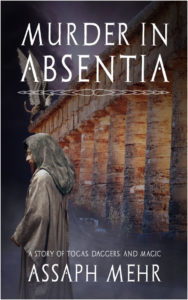 This week the spotlight shines on a talented author who likes to dabble in mixed genres. I very much enjoyed his first novel and have also enjoyed reading the short stories about Felix the Fox on his website.
This week the spotlight shines on a talented author who likes to dabble in mixed genres. I very much enjoyed his first novel and have also enjoyed reading the short stories about Felix the Fox on his website.
Assaph has been a bibliophile since he learned to read at the age of five, (he had to yell at the librarian that he can read already so he could get a card) and a Romanophile ever since he first got his hands on Asterix, way back in elementary school. This was exacerbated when his parents took him on a trip to Rome and Italy – he whinged horribly when they dragged him to “yet another church with baby angels on the ceiling”, yet was happy to skip all day around ancient ruins and museums for Etruscan art.
With a rather diverse taste in reading – from fantasy to philosophy, from ancient times to the far future, he has since been feeding his addiction for books with stories of mystery and fantasy of all kinds. A few years ago he randomly picked up a copy of a Lindsay Davis’ Marcus Didius Falco novel in a used book fair, and fell in love with Rome all over again, this time from the view-point of a cynical adult. His main influences in writing are Steven Saylor, Lindsey Davis, Barry Hughart and Boris Akunin.
After years of reading and only dreaming of seeing his name in print, he suddenly started writing in 2015. He owes this to his wife, who complained that there was nothing good left to read. Once the challenge was accepted and Murder In Absentia was born, Assaph just kept on writing – short stories, flash fiction, and now a second full length novel. You can find them all on egretia.com. His first novel Murder In Absentia is an “historically-themed, urban high-fantasy, hardboiled murder mystery, with just a dash of horror”.
When he’s not busy mashing up genres or interviewing other author’s characters on TheProtagonistSpeaks.com, this ex-Israeli-turned-Aussie enjoys his kids, cats, wife and even his day job. He hopes that his thirty years of martial arts make his fight scenes realistic, and that his love of history shines through his work.
Assaph now lives in Sydney, Australia with his wife Julia, four kids and two cats. By day he is a software product manager, bridging the gap between developers and users, and by night he’s writing – he seems to do his best writing after midnight.
All the places you can find Assaph and his writing on the web
Website: http://egretia.com
Blog: http://egretia.com/news
Facebook: http://facebook.com/AssaphMehrAuthor
Twitter: @assaphmehr
Google Plus: http://plus.google.com/+AssaphMehr
Goodreads: https://www.goodreads.com/author/show/14422472.Assaph_Mehr
Pinterest: https://www.pinterest.com/assaphmehr
Instagram: https://www.instagram.com/assaph/
Amazon Author Page: http://www.amazon.com/Assaph-Mehr/e/B015U1F3NC
Amazon buy link: http://amzn.to/1XbfKN1
From the Author
Murder In Absentia is the story I always wanted to read. I have been in love with ancient history, and in particular Rome, since I first laid eyes on Asterix. Growing up in Israel, a country steeped in millennia of human history, and playing D&D just helped cement that love.
As a kid, I was a voracious reader. I borrowed my sister’s library card when the librarian said I was too young for the Sci-Fi & Fantasy section. I grew up on all the classics, reading and rereading them as I matured. Along with sci-fi and fantasy, I loved mysteries and thrillers – Agatha Christie, Raymond Chandler, Dashiell Hammett and Alistair MacLean to name just a few.
So when it came time to write, I had it all in my head – all jumbled together in my hand. I sub-titled Murder In Absentia as “a story of Togas, Daggers, and Magic”, as it draws elements of ancient Rome, Fantasy and Mystery. It’s also a bit shorter than “an historically-themed urban high-fantasy noir detective mystery (with a splash of horror)”.
If you like any two out of the three (Rome, Fantasy, and Mystery), give Murder In Absentia a shot. I trust you will enjoy reading it as much as I enjoyed writing it.
Videas Lumen!
Assaph
Ducky’s Quill interviews Assaph Mehr
DQ: Your bio says you were raised in Israel. Do you think growing up in a country once controlled by the Romans influenced your interest in that historical period?
AM: I recall standing on the hill of Old Jaffa, looking at the archaeological digs down. From the top you can see the Ottoman walls, and a few of Napoleon’s cannons that were brought up from the waters. Looking down, you can see the Arab settlement, and under it the Roman, which stands on top of the Greek. If you dig even deeper, you’ll find Phoenician (Philistine) and Egyptian temples. Across the waters are a few jagged rocks jutting out of the water. They are called Andromeda’s Rock, as according to legend this was where Andromeda was chained to the rocks to appease the sea monster Cetus, and Perseus rescued her by riding Pegasus.
I don’t think that the Roman occupation of Israel had much of an effect about my specific interest, but growing up in the place that was part of the dawn of civilization greatly influenced my love of history in general. I always liked the day trips to any old ruins, whatever the period (and, being Israel, almost every corner has a history going back a couple of millennia).
My love of Roman culture can be attributed to my love of Asterix, and to a trip to Italy my parents took me when I was 13.
DQ: I took a trip to Italy when I was in college. I loved Pompeii and Capri and would go back to spend more time in either place. Have you had a chance to go back to Italy since you were a child? What places there would you most want to visit again or for the first time?
AM: Sadly I have not. I also haven’t been south of Rome (we went north in our trip). It is certainly something I am looking forward to doing again!
I’d love to visit Pompeii, as well as Rome, Rimini and many other places I have only heard about.
DQ: As I read Murder in Absentia, I noticed that you included several kinds of food from the very common to richer fare. How did you come up with the dishes you describe?
AM: Some of them (most, really) are historically accurate. Garum (fermented fish sauce) in particular. The recipes come from various places, especially Apicius. There are also plenty of “experimental archaeologists”, who try to find out how Roman life was like – from how the legions fought, to how food was cooked and hair was braided. The obsession with squid is purely my own.
This goes beyond the food itself, though. All the dining arrangements and the culture around cuisine are true as well. From the street food (Romans were big on take away) to the arrangement of dining couches in formal dinners, it’s all historically accurate.
Food, wine and dining are such an important aspect of any culture, that I felt it critical to integrate it into the novel, to bring another layer of realism and richness to the culture in the novel.
DQ: Your book reminded me very much of the TV show Rome, except for all the backstabbing and plotting among the nobility. I couldn’t help but see a certain actor from that show as I read the book. Tell me who would you most want to play Felix the Fox should your book ever be made into a movie or TV series?
AM: There are a lot of good options… A younger Javier Barden or a (much younger) Harrison Ford would do nicely. The role will need that rascally charm, as well as the darker undertones for some of the adventures.
As for the TV series Rome, I absolutely loved it despite the occasional historical inaccuracies. I think the cast was generally excellent, and carried the roles very well.
Ciarán Hinds (Caesar) is probably the best fit, both in looks and in charm (though again, he’s a bit older than Felix). Ray Stevenson (Titus Pullo) is a good actor, but he’s about a foot taller and twice the muscles than Felix.
DQ: There is a remarkable amount of data from the Roman era available to us. What made you decide to go with the “fantasy” aspect and add magic rather than a simple detective story?
AM: Two aspects. One, I know enough to know how much I don’t know. I knew that I could never be completely satisfied with the amount of historical research I’ll be able to do, and I wanted to get on with the actual storytelling. Second, it’s not necessary for the stories to be tied to a particular time in Rome’s history, with the associated people and events. It might actually be more distracting.
So instead I opted for a fantasy world. This opened up a lot of possibilities. I was able to pose many “what if” questions, and play around with how Roman society would develop – given the existence of magic, and certain highly influencing events.
For example, there is a list of past events detailed in the description of the bas-relief on the Pharos lighthouse. These all mimic events from our Rome’s history – but with a twist. I also toned down the grecophilia that took over Rome in later years.
DQ: I grew up on shows like Columbo, McCloud, Murder She Wrote and Quincy. The style of your story reminded me very much of Columbo and the way he would wrap it all up in the end based on one little thing he had observed that the viewer might not have. What “detective” stories/shows influenced Felix the Fox?
AM: I grew up on the same shows, as well as many similar novels – from classics like Agatha Christie, Raymond Chandler and Dashiell Hammett, to modern thrillers like Alistair MacLean and Tom Clancy. I think they all had an influence on the style of the novel – mixing adventure with cozy mystery.
In particular, two Roman-era detectives, Lindsey Davis’ Falco and Steven Saylor’s Gordianus, had the most influence on Felix. As a tribute, I made a passing remark that he learned to be a detective from Gordius and Falconius.
DQ: I thoroughly enjoyed Murder in Absentia. Do you have further adventures in store for Felix and when can we expect to see another book from you?
AM: Certainly. I am currently working on the second book, titled In Numina. I have plots for two more full-length novels, In Victrix and In Memoriam (spot the theme). I’ll probably come up with more as I write, considering the plots for these novels came to me as I was working on Murder In Absentia.
In the meantime, I publish short mysteries with Felix on my blog. It can give you a taste about the style of storytelling and about Felix. You can find them on http://egretia.com/short-stories.
DQ: You seem to have carved an interesting little niche with your Historical Fantasy story. What other genre/s might you try your hand at in the future?
AM: I’ll probably remain with historical fantasy (I just adore this blend). I have these plans for a retelling of the Crimean War – from the Russian side – with steampunk elements. I mean, who can resist a young and dashing Count Tolstoy with a mechanical arm?
It is a long way in the future though.
DQ: What character do you tend to play most in D&D? Do you think that has affected your writing?
AM: It’s been years since I played, but I often played the wizard. I have a tendency to pick up jacks-of-all-trades, but with a magical bend. Somewhat like Felix…
And if you ever played Shadowrun (and this joke will only make sense if you did), I used to play a Troll Decker.
Thanks much for the opportunity! It’s nice to see the personal questions.
DQ: Thank you Assaph for your answers to my questions.
Read on for my review of Murder in Absentia
Murder in Absentia is a mixed genre tale of intrigue, complete with a plot to overthrow the 1%, travel to exotic locales, and hobnobbing with some august presences. The tale begins when Felix the Fox is summoned to the home of a wealthy politician. There he discovers a murder most foul and the father of the deceased hires him to find out who did the deed and why his son was killed. As Felix travels about seeking the answers, many wondrous creatures and events are uncovered. But can he find the murderer?
My flowery language above is an attempt to help prospective readers get in the right mindset for this story. I am a fan of the murder mystery genre, the fantasy genre, and the historical fiction genre. Consequently, I was happy to dive into this book that mixes and mashes all three into one delightful romp. The possibility for over the top campiness was skillfully avoided, as was the easy path of making everything magical. Instead Assaph Mehr wrote a story that could have taken place in a Sherlock Holmes mystery weaving the mundane with a light touch of magic to make an altogether engaging read.
I particularly liked the attention to detail in the historical dress, lifestyle, food, and housing of the people of Egretia. As I read it, I recognized names slightly changed and a focus on a different type of governing bodies than in ancient Rome, yet the places, names, styles and customs had so much familiarity that I felt like I was there walking the streets of the great city, sipping wine in the Forum while my contemporaries argued politics, economics, and academics. Any student of ancient Rome knows the mythology of the time was an integral part of the daily lives of the people. Because of that, meeting a sybil on a lonely island was not out of place at all. Each detail of the lives of the Egretians was skillfully interwoven with the fantastical and mythological.
I have traveled to Italy, visited the ancient ruins of Pompeii, and experienced the Italian propensity for good food. This murder mystery did not ignore the national past time and it made me hungry in several places reading about the meals in detail. (Although I must admit the tour of the garum factory left me very much not interested in sampling that delicacy.) I particularly enjoyed the fast thinking Felix exercised with the governor of Kebros before the feast.
Now to talk about the issues. There were a few typos and misused or missing words. This can be found in just about every book I’ve ever read. These kinds of errors were rare and not glaring, so it did not interfere with my enjoyment of the book. The part I did find distracting was the words in italics. I learned they are the ones in the glossary and I am the type that will interrupt the story to go look something up in the glossary, so that broke the rhythm of my reading a lot. It is a quirk of mine and should not cause anyone reading this to pass this book by. The story is compelling enough that these small issues can be easily overlooked.
Overall, I loved this book and recommend it to anyone who likes any of the genres listed above and isn’t too much of a purist about mashing them up. Good job Assaph and I’m giving you my highest compliment here: I can’t wait to read more about Felix the Fox.





Well done and fascinating interview and review. I am very interested in reading the book after this. Thanks.
Can I come live in your library for a few months? Definitely whetted my interest!
Good. It’s a really fun book.